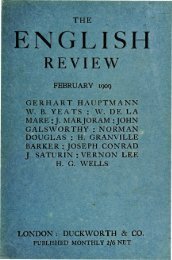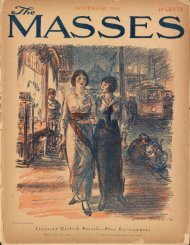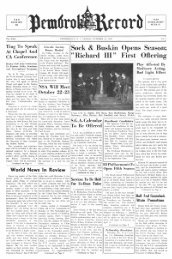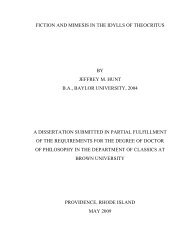View PDF - Brown Library
View PDF - Brown Library
View PDF - Brown Library
You also want an ePaper? Increase the reach of your titles
YUMPU automatically turns print PDFs into web optimized ePapers that Google loves.
250 Militarism and Democracy in Germany<br />
not guilty; the prosecutor asked only for<br />
imprisonment, but the military judges<br />
pronounced the death sentence in addition<br />
to imprisonment. They felt they<br />
must uphold their caste, right or wrong.<br />
A lieutenant stationed at Memel was<br />
found to have beaten a soldier so severely<br />
with a sword that his victim had to be<br />
dropped from the military service, compensated,<br />
and pensioned for injuries "incident<br />
to the service." Not that the<br />
other type of officer is lacking. As the<br />
writer knows by personal experience, there<br />
are plenty of kindly, gifted, and charming<br />
officers who are neither fire-eaters<br />
nor war-worshippers, who write no jingo<br />
books and do not subscribe to Bernhardi.<br />
They despise the intrigues, the narrowness,<br />
and frequent immorality of the small garrison,<br />
and the dissipation of life in the big<br />
cities. They recognize the mediaeval character<br />
of the code of honor, but they are<br />
helpless to change it, and as they grow<br />
older the more ready they are to think an<br />
intense militarism the normal condition of<br />
society. If there are many officers of this<br />
type, particularly in the south German<br />
armies, the trend is, however, toward the<br />
overbearing arrogance of the Von Reuters,<br />
which is again merely saying that militarism<br />
unchecked and unsubordinated to<br />
civilian control will run to excesses everywhere.<br />
The note of Bernhardi has been<br />
more and more often heard with the cry<br />
that war is the natural state of man and<br />
that the German army is for war. It is<br />
quite possible that the Kaiser, in the last<br />
moments before the war, was overborne<br />
against his better judgment by the General<br />
Staff clique with which he is surrounded,<br />
and signed the fatal order practically<br />
under compulsion. But there were<br />
thousands of his officers who went to the<br />
war exulting that the time had come at<br />
last when their years of devoted study and<br />
ceaseless training, unsurpassed in its comprehensiveness<br />
and its intensity, were to<br />
give way to the practical application of all<br />
they had learned as to man-killing.<br />
Whether an army which by its very existence<br />
creates fear and militaristic rivalry,<br />
which forever talks war, can be either a<br />
democratic force or, in the long run, a<br />
sound educational influence is open to<br />
gravest question. As an educational system<br />
it has the merits described earlier in<br />
this article; but even German professors<br />
would hardly deny that it is bought at a<br />
heavy cost to the school system of the<br />
empire. If there are underpaid commonschool<br />
teachers anywhere they live in Germany,<br />
and particularly in Bavaria. The<br />
genteel poverty of these men who have to<br />
exist upon their pay is one of the great<br />
tragedies of life under the Kaiser. But<br />
the economic waste of the army is a chief<br />
stumbling-block to any betterment in their<br />
condition, precisely as the millions it costs<br />
prevent reforms in many other directions.<br />
It would seem as if it would be better to<br />
have the Krupps earn less than twelve<br />
or fourteen per cent per annum and the<br />
school-teachers a little more. It would be<br />
better to be less efficient as a nation to the<br />
extent that that efficiency is created by<br />
the army, and for the masses to be happier,<br />
with a consequent decrease of a million<br />
or so in the Social Democratic voters.<br />
As long as they can roll up three millions<br />
of votes and still protest against militarism,<br />
even though swept off their feet in war<br />
time, all cannot be well with a culture<br />
founded on military force. That their<br />
voices and many others will again be uplifted<br />
to protest against war and armies<br />
when peace returns is the one thing that<br />
is certain about this war.<br />
In no such military and bureaucratic<br />
atmosphere as exists in Germany does<br />
democracy thrive ! Instead, we have the<br />
tradition that as the German Empire is<br />
the army's creation so the nation's future<br />
is dependent wholly upon it. Imitating<br />
the ninety-three savants, three thousand<br />
German teachers in universities and<br />
schools of technology have put their names<br />
to the statement that there is no other<br />
spirit in the army save that of the nation;<br />
that the spirit of German knowledge and<br />
militarism are the same; that the German<br />
army and the German universities are<br />
identical in their aspirations, since both<br />
are devoted to science. They, too, apparently<br />
cannot understand that a culture<br />
which exists only by reason of the arms<br />
behind it is no more a normal, healthy<br />
growth than is an industry artificially<br />
created by a protective tariff and kept<br />
alive solely by receiving part or all of its<br />
profits by the favor of a treasury. They<br />
belie their own culture because it is a free<br />
growth while service in the army is com-










